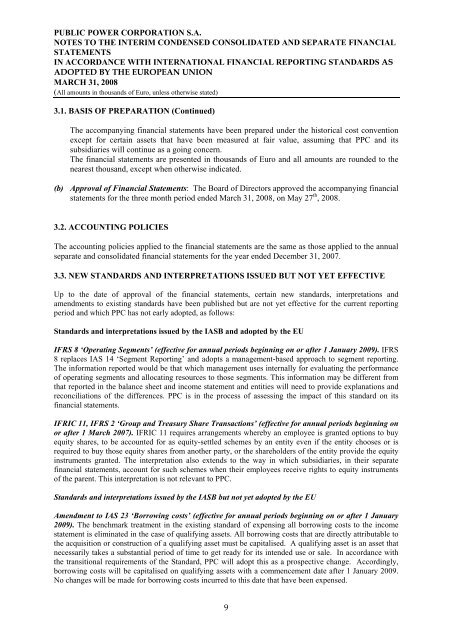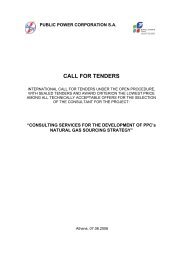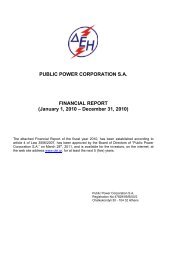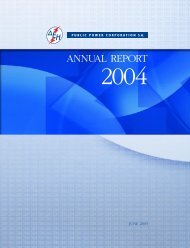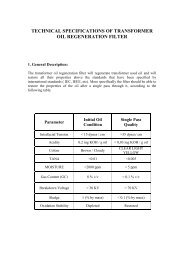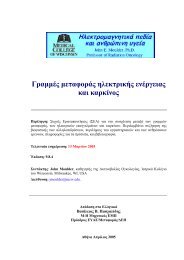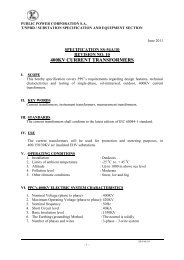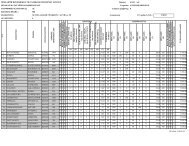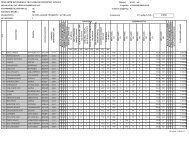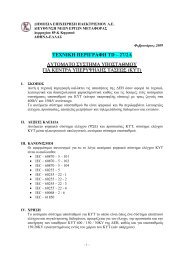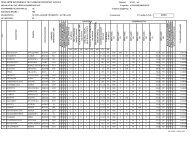31 March 2008(pdf)
31 March 2008(pdf)
31 March 2008(pdf)
You also want an ePaper? Increase the reach of your titles
YUMPU automatically turns print PDFs into web optimized ePapers that Google loves.
PUBLIC POWER CORPORATION S.A.NOTES TO THE INTERIM CONDENSED CONSOLIDATED AND SEPARATE FINANCIALSTATEMENTSIN ACCORDANCE WITH INTERNATIONAL FINANCIAL REPORTING STANDARDS ASADOPTED BY THE EUROPEAN UNIONMARCH <strong>31</strong>, <strong>2008</strong>(All amounts in thousands of Euro, unless otherwise stated)3.1. BASIS OF PREPARATION (Continued)The accompanying financial statements have been prepared under the historical cost conventionexcept for certain assets that have been measured at fair value, assuming that PPC and itssubsidiaries will continue as a going concern.The financial statements are presented in thousands of Euro and all amounts are rounded to thenearest thousand, except when otherwise indicated.(b) Approval of Financial Statements: The Board of Directors approved the accompanying financialstatements for the three month period ended <strong>March</strong> <strong>31</strong>, <strong>2008</strong>, on May 27 th , <strong>2008</strong>.3.2. ACCOUNTING POLICIESThe accounting policies applied to the financial statements are the same as those applied to the annualseparate and consolidated financial statements for the year ended December <strong>31</strong>, 2007.3.3. NEW STANDARDS AND INTERPRETATIONS ISSUED BUT NOT YET EFFECTIVEUp to the date of approval of the financial statements, certain new standards, interpretations andamendments to existing standards have been published but are not yet effective for the current reportingperiod and which PPC has not early adopted, as follows:Standards and interpretations issued by the IASB and adopted by the EUIFRS 8 ‘Operating Segments’ (effective for annual periods beginning on or after 1 January 2009). IFRS8 replaces IAS 14 ‘Segment Reporting’ and adopts a management-based approach to segment reporting.The information reported would be that which management uses internally for evaluating the performanceof operating segments and allocating resources to those segments. This information may be different fromthat reported in the balance sheet and income statement and entities will need to provide explanations andreconciliations of the differences. PPC is in the process of assessing the impact of this standard on itsfinancial statements.IFRIC 11, IFRS 2 ‘Group and Treasury Share Transactions’ (effective for annual periods beginning onor after 1 <strong>March</strong> 2007). IFRIC 11 requires arrangements whereby an employee is granted options to buyequity shares, to be accounted for as equity-settled schemes by an entity even if the entity chooses or isrequired to buy those equity shares from another party, or the shareholders of the entity provide the equityinstruments granted. The interpretation also extends to the way in which subsidiaries, in their separatefinancial statements, account for such schemes when their employees receive rights to equity instrumentsof the parent. This interpretation is not relevant to PPC.Standards and interpretations issued by the IASB but not yet adopted by the EUAmendment to IAS 23 ‘Borrowing costs’ (effective for annual periods beginning on or after 1 January2009). The benchmark treatment in the existing standard of expensing all borrowing costs to the incomestatement is eliminated in the case of qualifying assets. All borrowing costs that are directly attributable tothe acquisition or construction of a qualifying asset must be capitalised. A qualifying asset is an asset thatnecessarily takes a substantial period of time to get ready for its intended use or sale. In accordance withthe transitional requirements of the Standard, PPC will adopt this as a prospective change. Accordingly,borrowing costs will be capitalised on qualifying assets with a commencement date after 1 January 2009.No changes will be made for borrowing costs incurred to this date that have been expensed.9


